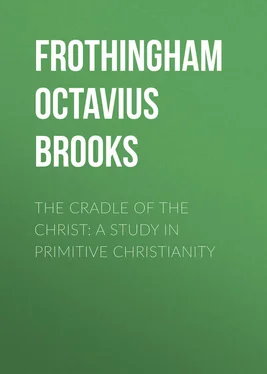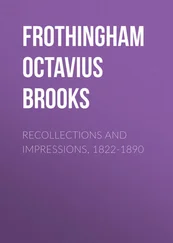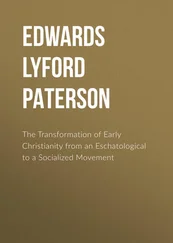Octavius Frothingham - The Cradle of the Christ - A Study in Primitive Christianity
Здесь есть возможность читать онлайн «Octavius Frothingham - The Cradle of the Christ - A Study in Primitive Christianity» — ознакомительный отрывок электронной книги совершенно бесплатно, а после прочтения отрывка купить полную версию. В некоторых случаях можно слушать аудио, скачать через торрент в формате fb2 и присутствует краткое содержание. Жанр: foreign_religion, foreign_antique, foreign_prose, на английском языке. Описание произведения, (предисловие) а так же отзывы посетителей доступны на портале библиотеки ЛибКат.
- Название:The Cradle of the Christ: A Study in Primitive Christianity
- Автор:
- Жанр:
- Год:неизвестен
- ISBN:нет данных
- Рейтинг книги:4 / 5. Голосов: 1
-
Избранное:Добавить в избранное
- Отзывы:
-
Ваша оценка:
- 80
- 1
- 2
- 3
- 4
- 5
The Cradle of the Christ: A Study in Primitive Christianity: краткое содержание, описание и аннотация
Предлагаем к чтению аннотацию, описание, краткое содержание или предисловие (зависит от того, что написал сам автор книги «The Cradle of the Christ: A Study in Primitive Christianity»). Если вы не нашли необходимую информацию о книге — напишите в комментариях, мы постараемся отыскать её.
The Cradle of the Christ: A Study in Primitive Christianity — читать онлайн ознакомительный отрывок
Ниже представлен текст книги, разбитый по страницам. Система сохранения места последней прочитанной страницы, позволяет с удобством читать онлайн бесплатно книгу «The Cradle of the Christ: A Study in Primitive Christianity», без необходимости каждый раз заново искать на чём Вы остановились. Поставьте закладку, и сможете в любой момент перейти на страницу, на которой закончили чтение.
Интервал:
Закладка:
III.
THE SECTS
The popular aspect of the Messianic hope was political, not religious or moral. The name "Messiah," was synonymous with "King of the Jews;" it suggested political designs and aspirations. The assumption of that character by any individual drew on him the vigilance of the police. In this condition of affairs the public sentiment was divided between the Conservatives and the Radicals. The first party comprised the wealthy, settled, permanent, cautious people whose patriotism was tinged with prudent reflection. They saw the hopelessness of revolt, its inevitable failure, and the worse tyranny that would follow its bloody suppression; they put generous interpretations on the acts and intentions of the imperial power, did justice and a little more than literal justice to acts of clemency or forbearance, appreciated the value of the Roman supremacy in preserving internal quiet and keeping other plunderers at a distance; and had confidence that patience and diplomacy would accomplish what force could not undertake. They were careful, therefore, to maintain a good understanding with the powers that were, and frowned on all attempts to revive the national spirit.
The conservatives were of all shades of opinion, and of all parties; the radicals were, as is usually the case, confined mostly to those who had little to lose, either of wealth, reputation, or social position. The supremacy of Israel, the restoration of the Jewish Commonwealth, the overthrow of the wealthy and powerful, the reinstatement of the poor, the unlettered, the weak, the suffering, the downtrodden "children of Abraham," composed the group of ideas which made up the sum of their intellectual life. The Roman dominion was abhorred not because it was cruel, but because it was sacrilegious. Diplomacy, with these, was another word for time-serving; policy another phrase for cowardice; they detested prudence as ignoble; they distrusted conciliation as apostacy; they put the worst construction on the fairest seeming deeds, dreading nothing so much as agreement between the chief men of Israel and the minions of the empire.
The educated and responsible classes were chiefly conservative. No sect was so entirely, for no sect comprised all of these classes; but some sects were naturally more conservative than others. The Sadducees were, on the whole, the most so; not by reason of their creed particularly, but through the influence of their historical antecedents. After the capture of Jerusalem by Ptolemy, 320 B. C., some hundred thousand Jews went to Egypt and attained consequence there; had their own religious rites and temple. Contact with Greek thought and life there enlarged their minds. Their old-fashioned Hebraism seemed strait and prim by the side of the splendid exuberance of Gentile life in Alexandria. Jerusalem looked, in the distance, like a provincial town; the wealth of pagan literature dwarfed their Scriptures to the dimensions of a single deep but narrow tradition. They were Jews still, but bigoted Jews no longer. How unreasonable seemed now the prejudices of exclusive race! how unwise the attempts to maintain peculiarities of custom! how fanatical the efforts to impose them upon others! The world was large and various: the order of the world followed the track of no one law-giver, prophet or saint.
The sect of Sadducees is supposed to have risen from this pagan soil. It was a sect of rationalists, free-thinkers, skeptics, eclectics; Jews, but not dogmatists of any school. They believed in culture and general progress, and had the characteristic traits of men so believing. They were cool, unimpassioned, scientific; sentimentalism they abjured; enthusiasm to them was folly. They were glad to graft Greek culture on Hebrew thought, and would not have been sorry to see the small Hebrew state absorbed by some world-wide civilization. Moses they revered, and his law; but the aftergrowth, priestly and prophetic, they discarded. No doubt they thought the priests superstitious, the prophets mad, the restorationists a set of fools, the vision of Israel's future supremacy the mischievous nightmare of distempered minds. As a literary class the Sadducees were few and select; aristocratic in taste, supercilious in manners. They were in favor with the governors placed over the people by Roman authority, on account of their cultured moderation; and in return for social and political support, received offices in the State, and even in the Church. Caiaphas, the high priest in the time of Jesus, was a Sadducee, and was raised to that dignity by Valerius Gratus, Pilate's predecessor in office.
The Sadducee was a man of the world; not in the bad sense, but in the strict sense of the term. Disbelieving in immortality, he confined his view to the possibilities of the time; disbelieving in angels and special providences, he put confidence in temporal powers; disbelieving the doctrine of divine decrees and manifest destiny, he pursued the calculations of policy and held himself within the reasonable compass of human motives. Compromisers on principle, the Sadducees were unpopular in a community of earnest Jews. They bore bad names, were called epicureans, sensualists, materialists, cold-blooded aristocrats, allies of despotism; but they deserved these abusive appellations no more than men of the same description in modern states deserve them. The abusive epithet was one of the penalties they had to pay for the intellectual and social consequence they enjoyed.
The Pharisees were more numerous, more commonplace and more popular. They were, in fact, the great popular sect. They were of more recent origin than the Sadducees, their history going back only about a century and a half before the time of Jesus. Their name, which means "exclusive" or "elect," "set apart," sufficiently indicates their character. They were the "strait" sect; Hebrews of the Hebrews; Puritans of the Puritans; the quintessence of theocratic fervor and patriotic faith; the true Israel. Strict constructionists they were; friends to the law and the testimony; worshippers of the letter and the form; painstaking preservers of every iota of the written word; firm believers in the destiny of Israel, in the special providence that could accomplish it, in the angelic powers whose agency might be needed to fulfil it, in the future life when it was to be fulfilled. They held to the law, and they held to the prophets, major and minor; they could divide the word of the Lord to a hair.
The Pharisees have usually been called a sect; they were not so much a sect as a party. Church and State being one in the conception of a theocracy, or government of God, the devotee and the politician were the same person; the dogmatist was the democrat; the man of narrowest creed was the man of widest sympathies; the most exclusive theologian was the most popular partisan. To keep Israel true to the faith, and, in consequence of that to save it from political decline, was, from the first, the Pharisee's mission. He never lost it from his view. His eye was steadily fixed on the issues of the day, as they involved the destinies of the future. In order that he might be a patriot, he was anxious to preserve unimpaired his puritanism; and in order that he might preserve his puritanism unimpaired, he attended diligently to the duties of patriotism.
The Pharisee cherished the Messianic hope. It was part of his faith in the destiny of Israel, and the great practical justification of his belief in the resurrection of the dead; he believed in personal immortality, because he believed in the Christ who would come to bestow it. It was an article of the patriot's creed; the joy of the Messianic felicity being the reward for fidelity to Israel. The hope presented to him its political aspect, that being the aspect really fascinating to patriotic contemplation. The moral and spiritual aspects were incidental to this. In fact the moral and spiritual aspects were scarcely thought of. It was reserved for Christianity to develop these when the literal doctrine had lost its interest, and the heavenly kingdom had been transported from the earth to the skies. A thousand and a half of years have not spiritualized the belief with the multitude. Still the Pharisaic doctrine is the accepted faith; a purely rational human faith in immortality is entertained by the philosophical few. The Pharisees constituted a sort of Young Men's Hebrew Association, loosely organized for the maintenance of the faith and the fulfilment of the destiny of Israel.
Читать дальшеИнтервал:
Закладка:
Похожие книги на «The Cradle of the Christ: A Study in Primitive Christianity»
Представляем Вашему вниманию похожие книги на «The Cradle of the Christ: A Study in Primitive Christianity» списком для выбора. Мы отобрали схожую по названию и смыслу литературу в надежде предоставить читателям больше вариантов отыскать новые, интересные, ещё непрочитанные произведения.
Обсуждение, отзывы о книге «The Cradle of the Christ: A Study in Primitive Christianity» и просто собственные мнения читателей. Оставьте ваши комментарии, напишите, что Вы думаете о произведении, его смысле или главных героях. Укажите что конкретно понравилось, а что нет, и почему Вы так считаете.











![Anne Blunt - A Pilgrimage to Nejd, the Cradle of the Arab Race. Vol. 1 [of 2]](/books/749489/anne-blunt-a-pilgrimage-to-nejd-the-cradle-of-the-thumb.webp)
![Anne Blunt - A Pilgrimage to Nejd, the Cradle of the Arab Race. Vol. 2 [of 2]](/books/750183/anne-blunt-a-pilgrimage-to-nejd-the-cradle-of-the-thumb.webp)